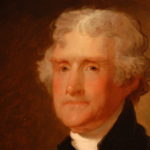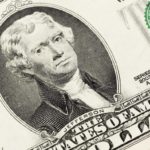Thomas Jefferson’s name is synonymous with America. He is, next to George Washington, the most famous Founding Father, known for his authorship of the Declaration of Independence and the stirring proposition that “all men are created equal” with rights to “life, liberty, and the pursuit of happiness.” Jefferson is also condemned as a hypocrite, a man who recognized the moral depravity of slavery, sought to limit its expansion, yet was a slaveholder all his life. We tend to think of Jefferson as a flawed man but a soul of genius who never lived up to his highest ideals. Rarely, though, do we have much awareness of the intellectual and personal contours that influenced his most famous writings—until now.
Fred Kaplan’s new biography of Thomas Jefferson, His Masterly Pen (Harper 2022), doesn’t tell the typical Jefferson story. It is not a hagiography of Jefferson’s rise to greatness from the perspective of politics. Neither is it a critical biography meant to tear down and deconstruct his failings as a thinker and statesman. Instead, Kaplan’s magisterial work looks at Jefferson’s life through the prism of his writings—political, personal, and social—and how “the most controversial Founding Father” was a man of intricate relationships rather than a solitary hilltop genius. Indeed, his best, most contentious, and most inspirational ideas often came from others before getting the quintessential Jeffersonian touch added to them.
Jefferson didn’t rise to fame during or after the writing of the Declaration, as popular perception has it. He was already a well-known writer before the American Revolution began. His work as a lawyer, which required skills in research and writing, was “excellent preparation for the role he was soon to play in the Anglo-American world of public dispute and resolution” in the early 1770s. The skills he cultivated during his legal work led him to write A Summary View of the Rights of British America, an early articulation of the rights and liberties of American colonists. As Kaplan notes, “It put Jefferson’s name on the transatlantic map.”
And Jefferson’s “Declaration for the Causes and Necessities of Taking Up Arms” and “Resolutions of Congress on Lord North’s Conciliatory Proposal” made him widely known for advocating the cause of American liberty. Both of these were written before the first shots of the American Revolution were fired at Lexington and Concord. In these early political writings, Jefferson drew on the English Bill of Rights and other colonial political literature, employing the language of rights, liberties, and natural law. This gave Jefferson the material he needed to put his unique touch on the Declaration of Independence, including borrowing from fellow Virginian George Mason, who had written the Virginia Declaration of Rights just before the Continental Congress’s meeting in Philadelphia.
Start your day with Public Discourse
Sign up and get our daily essays sent straight to your inbox.We who live in the aftermath of Jefferson’s fateful words take for granted what wasn’t taken for granted, even in the world of the so-called High Enlightenment. As Kaplan writes, “The Declaration of Independence startled, even shocked, the British ruling class. It made claims about the sources of power and polity, especially about what arrangements of power best served a country’s interests, that had never been made before.” And this is true. The concept that humans were free, not subject to rulers, and had certain “unalienable Rights,” was a groundbreaking declaration in political theory. But what was even more groundbreaking was how Jefferson deliberately suggested, through his own political mythmaking, that these principles had always applied to British people. In this sense, Jefferson was arguing that the Americans were more authentically British than the British: after all, the rights and liberties he identified stretched back to the Anglo-Saxons, Magna Carta, English Bill of Rights, and the local customs transplanted from the mother island to the shores of North America.
Jefferson was a man of imaginative awe, a soul that sought the sublime in nature, and his description of Virginia’s natural wonders (including the Blue Ridge Mountains and its many rivers) captures the spirit of a quasi-naturalistic mystic.
Another aspect of Jefferson’s life that is often forgotten is his talent as a naturalist and scientist. Kaplan does an admirable job of examining the Notes on the State of Virginia, written during Jefferson’s flight from Richmond and Monticello during the final years of the American Revolution. The work “bec[a]me a classic of a singular kind and genre.” In the Notes, Jefferson gives his contradictory views on slavery, condemning it is an immoral practice while also holding out hope that education and moral progress will cause slavery to fade away without violent revolution. But where the Notes truly shine is in Jefferson’s scientific and naturalistic commentary: his descriptions of weather, geography, and the nature reveal a man awed by the Edenic paradise around him. Jefferson was a man of imaginative awe, a soul that sought the sublime in nature, and his description of Virginia’s natural wonders (including the Blue Ridge Mountains and its many rivers) captures the spirit of a quasi-naturalistic mystic.
Not only was Jefferson political theorist and naturalist, he was also a man of aesthetic and literary taste. Laurence Sterne was his favorite novelist. And in his letters to a French visitor and admirer, François-Jean de Beauvoir, Jefferson showcases the breadth of his reading of English literature, poetry most especially. His almost entirely forgotten “Thoughts on English Prosody” highlights Jefferson’s personal poetic library and how much he memorized of John Milton, Alexander Pope, Jonathan Swift, and William Shenstone, not to mention the Bible. Jefferson was clearly a lover of great poetry, a man who was as much imbued by the spirit of rational and scientific inquiry as by sentimentalism. His readings in English literature reveal his cosmopolitan outlook: he read republicans like Milton alongside Tories like Swift, and Protestant non-conformists alongside Catholics like Pope. Though Jefferson harbored well-known religious prejudices, when he was quoting English poetry, no one would have known.
After the American Revolution came to an end, Jefferson’s time in Europe and his personal correspondence shows us a man of deep emotion rather than a solitary intellectual genius detached from his passions. His letters to Maria Cosgrove, the Anglo-Italian Catholic noblewoman, especially his famous Head–Heart dialogue, reveal the intellectual and moral wrestling that Jefferson struggled with in attempting to reconcile two seemingly different strands of human nature: the stoic, rationalist, and anti-passionate “head” in contrast to the “heart” of erotic longing, suffering, pain, and love. The head represented cold, empirical “science;” the heart, “morals.” Jefferson tries to bridge the two together, but what becomes clear in Kaplan’s analysis of Jefferson’s writings is that Jefferson favored the moral heart despite his reputation as a rationalist man of science.
Perhaps the key insight of Kaplan’s biography of Jefferson is that even though Jefferson put his quintessential touch on much of what he wrote, his writings didn’t occur in a vacuum. As already mentioned, some of his best-known language from the Declaration of Independence was borrowed from the English Bill of Rights, George Mason’s Virginia Declaration of Rights, andhis own earlier political writings. One of Jefferson’s oft-quoted political statements that “the earth belongs in usufruct to the living,” was borrowed from Richard Gem, a radical reformer and economist from Britain. Gem had written to Jefferson that he believed “one generation of men in civil society have no right to make acts to bind another. . .. The earth and all things whatever can only be conceived to belong to the living.” Jefferson was obviously in agreement, borrowing then revising from Gem.
In situating Jefferson as a man of letters, Kaplan presents the real genius of Jefferson: he listened to others. We would all do well to emulate Jefferson on this point. Jefferson was a man of many relationships, and his genius was a byproduct of those relationships.
Jefferson’s inaugural address speaks of continuity and calm amid division and hysteria. Rather than play up polarization for his personal gain, he attempted to calm it for national healing.
When Jefferson returned to government, first as secretary of state in George Washington’s administration, then as vice president and critic during the Adams administration, and finally as the third president of the United States, his political rhetoric foreshadowed the contemporary state of American politics. Jefferson, as some of us know, was an ardent critic of Hamilton, urban banking, and finance, and believed that a cabal of Hamiltonian allies was corrupting George Washington and the republic as a whole. Jefferson believed the Federalists were betrayers of the American Revolution, closet monarchists, and despicable Anglophiles. Jefferson’s political writings, both those under his own name and those written anonymously during his government years, are those of a populist.
Despite the tensions between his republican vision of a country of virtuous rural farmers and the urban commercial class of New England, Jefferson’s election in 1800 and his first inaugural address gave to posterity the American insistence on national unity despite profound political differences. When Jefferson wrote “We are all Republicans: we are all Federalists,” he didn’t really mean it. But Jefferson, astute politician that he was, knew the value of political unity and the optics of political continuity. His vision was vastly different from the course that the preceding Washington and Adams administrations had charted for the infant republic. Nevertheless, Jefferson’s inaugural address speaks of continuity and calm amid division and hysteria. Rather than play up polarization for his personal gain, he attempted to calm it for national healing.
His Masterly Pen is a superb and unique biography. In giving us a history of Jefferson the writer and the how, where, when, and why Jefferson wrote what he did, Kaplan gives to us the Jefferson we deserve. The biography is sympathetic but not hagiographic; it shows the social genius instead of the solitary sage of Monticello so often romanticized. Moreover, Kaplan reveals that Jefferson was a man of the heart as much as the head—if not more the heart than the head. Nearly two hundred years after his death, we still hope that the better side of Jefferson wins out, for ourselves, for our country, for our world. Though he died with misgivings and worries about America’s future, perhaps Jefferson can rest easy knowing that we hope with him, as he hoped himself, that the future is yet unwritten, and the blessings of liberty will grow and flourish as time advances.














